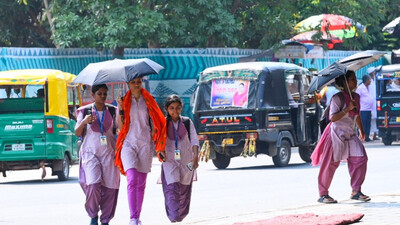Krishna raised the issue of uranium sale with Australia for the second consecutive day during his meeting with his counterpart Kevin Rudd who, however, said that his country`s stand remains unchanged.
The External Affairs minister had yesterday taken up the matter with Australia`s Resource, Energy and Tourism Minister Martin Ferguson.
Rudd acknowledged India`s clean record on nuclear proliferation, but maintained it was Australia`s national policy not to sell uranium to NPT non-signatories.
"Australia fundamentally respects India`s long standing credentials on the non-proliferation question," he said.
Addressing a joint press conference here with Krishna, Rudd acknowledged that India has not been responsible for a single act of nuclear weapons proliferation anywhere in the world.
"Something which we place on record again as being our views of India`s public policy posture and operational behaviour for a very long period of time," he said.
Australia is unwilling to sell uranium to India because it has not signed the Nuclear Non-Proliferation Treaty.
Rudd said the issue, however, has not damaged ties between the countries.
"However, Australia`s stands on NPT remains. We continue to discuss these matters as friends do," he said, emphasising on the strategic partnership that the two countries shared.
"There is a huge amount underway in the Australia-India relationship at the political, security and economic levels...
There`s sufficient ballast in this relationship to deal with areas of periodic disagreement as there are in all relationships," he said.
Commenting on the issue, Krishna said he has pleaded with the Australian government to change the policy, stressing that nuclear energy as a clean energy source was crucial to the rising energy demands of India.
"If you have to have clean energy, then according to India the only option is to have nuclear energy, and if you have to have nuclear energy, then you certainly need uranium," he said.
On the question of the security of Indian students in Australia, Rudd gave his full assurance to his counterpart.
He said as the Foreign Minister he takes the issue of security of any guests, including international students, "fundamentally and seriously."
"I take the responsibility and that is our job," he said after the seventh ministerial dialogue with Krishna.
Meanwhile, in a Joint Statement, Krishna and Rudd said they had reviewed the measures taken by the Australian Government in 2010 to address concerns over the safety and well being of Indian students in Australia.
Krishna noted that the changes in the skilled migration programme had significantly impacted on Indian students already studying in Australia, many of whom had taken heavy loans to pursue their studies.
He requested consideration of Indian students who had come to Australia under the old rules being placed in a special category that allowed them to fulfil the demand that existed in Australia for their skills.
Rudd noted the components of the changes to skilled migration in Australia and highlighted the generous transition arrangements for most holders of international student visas at the time of the changes.
The two ministers said they had detailed discussions on bilateral, regional and global issues of mutual interest.
"The discussions reinforced the growing convergence of interests, perspectives and assessments on the part of Australia and India," the statement said.
Rudd said Australia looked forward to hosting a visit by Prime Minister Manmohan Singh at the next Commonwealth Heads of Government Meeting in Perth in October 2011.
Rudd also reiterated Australia`s strong and long-standing support for a permanent seat for India on the United Nations Security Council.
The two ministers reiterated their strong support for nuclear non-proliferation and disarmament, the statement said.
Krishna and Rudd noted that India and Australia were united in the fight against terrorism. Looking forward to the next meeting of the bilateral Joint Working Group on Counter- Terrorism in 2011, they noted the need for practical cooperation in areas such as intelligence, police cooperation, terrorist financing and money laundering.
They also welcomed the entry into force of the Mutual Legal Assistance in Criminal Matters Treaty and the Extradition Treaty, which became operational today.
On bilateral economic ties, the statement noted that India was now Australia`s third largest overall export market and fifth largest trade partner. Australia is India`s 6th largest trading partner.
Krishna noted that the trade imbalance with Australia was the second largest that India had with any of its trading partners. He urged greater flexibility and requested for early action and on issues that impacted on India`s exports to Australia, especially in service exports (information technology) and products such as pharmaceuticals, mangoes and table grapes.
Further, the two sides have designated 2012 as the Year of Australia in India.












